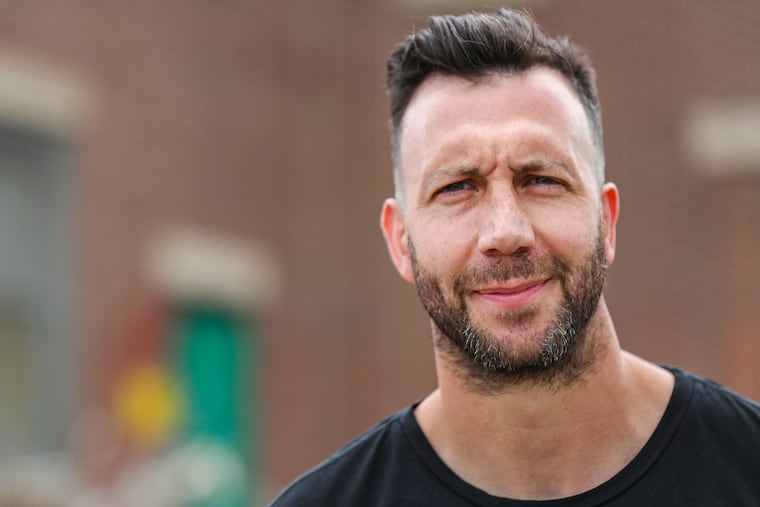Former Eagle Connor Barwin among group of Wharton School investors who chose an Italian basketball team over soccer
“We see basketball as the next sport that is going to bring a ton of investment because there’s a lot of value to be had there,” Barwin said.

ROME — Europe’s soccer leagues are so full of teams owned and operated by American investors that the market could soon be saturated.
That’s why an eclectic group of professionals studying in the executive MBA program at the University of Pennsylvania’s Wharton School turned their attention to basketball and acquired a 90% stake in top-tier Italian team Pallacanestro Trieste.
“We think we’re ahead of the next trend, which will be European basketball,” said Connor Barwin, a former Eagles linebacker who is now the team’s director of player development. “(Soccer) has gotten very expensive. And we see basketball as the next sport that is going to bring a ton of investment because there’s a lot of value to be had there.”
Barwin, along with Richard de Meo, the CEO of the brokerage firm Foenix Partners; finance lawyer Fitzann Reid; corporate lawyer Richard Johnson; Memphis Grizzlies team cardiologist John Jefferies; and energy strategist Prab Sekhon, who is Canadian, form the Cotogna Sports Group, which recently completed the purchase of the Trieste team for $5 million.
“We all are going to Wharton and we’re all kind of in our mid-thirties, successful people and an obsession for sports brought us all together,” Barwin said. “And we decided to come together and start this venture to try to have an impact on a community, a city, a team.”
Added Jefferies during a recent Associated Press video interview with the owners: “What I love about our team is everyone brings a different skillset to the table.”
The only previous American ownership in Italian basketball was the acquisition of Olimpia Milano by the Italian-American entrepreneur Pasquale Caputo back in 1999. Kobe Bryant, who learned to play in Italy while his father competed in the country, was an investor in that acquisition.
Gianni Petrucci, the president of the Italian basketball federation, welcomed the foreign investment.
“Nobody should be surprised or scandalized,” Petrucci said. “This is the reality with globalization. If they’ve come here, it means the Italian league is still attractive.
“Trieste has it all,” Petrucci added. “They’ve got good fans, a good arena and people who love basketball.”
As for the rest of European basketball, the most notable American owner is former Minnesota Timberwolves president David Kahn, who in 2018 founded the Paris Basketball team, which now plays in the top French league.
By comparison, six of the 20 teams in Italy’s top soccer league have North American owners, while the Premier League has eight, including Manchester United, Arsenal, Liverpool, and Chelsea.
Basketball, though, is a game that most Americans know better than soccer. Europe has been churning out elite talent, and the continent has long been a popular destination for U.S. college players who don’t make the NBA.
Besides football, Barwin briefly played college basketball at the University of Cincinnati.
“I had a number of friends that didn’t make it to the NBA,” Barwin said. “So they (went) and played across Europe.”
Trieste has six American players on its roster and currently sits eighth in the 16-team Lega Basket Serie A (LBA).
“Our goal is to get the team into the top of the LBA and into the EuroLeague,” Barwin said.
The LBA has traditionally been dominated by Milano and Virtus Bologna with 29 and 16 titles, respectively.
The last time a Trieste team won the Italian title was in 1941 when Ginnastica Triestina claimed its fifth championship.
Trieste’s next game is against Milano, which is owned by fashion designer Giorgio Armani.
“I’m excited to meet him and I’m excited to compete against him and then work together when we’re not playing each other,” Barwin said of Armani.
While Barwin was hoping to attend the game against Milano, his trip to Trieste will have to wait because the Eagles advanced to the Super Bowl.
Trieste has historic ties to the United States, going back to when the city was part of the Free Territory of Trieste in the aftermath of World War II and was controlled as an independent state by British and American forces due to its strategic importance straddling the border between Italy and Yugoslavia. American soldiers helped cultivate the city’s passion for basketball during those years. And Trieste still boasts about Michael Jordan’s visit in 1985 for an exhibition game.
The port city is still a cultural crossroads lying next to Italy’s current borders with Slovenia and Croatia — two countries with big basketball followings.
“The location is really important,” Barwin said, adding that his group is in for the long haul: “This is not a buy and sell. This is a buy and improve and improve and improve.”
The new Trieste owners talked to American chairmen of European soccer clubs for guidance before entering a climate where hard-core “ultra” fans can often influence the way a team operates.
“I was told very early on from someone that owns a number of soccer clubs is you do not own the team,” Barwin said. “You are just the steward of that team. And I actually I love that.
“When I played, you just rented your locker to last in the NFL. You got to work every single day. And if you don’t show your value or add your value, you will get replaced,” Barwin added. “We look at this the same way. We are just stewards for this team and if we don’t show our value to the fans and the players and people that work in that stadium then somebody will replace us. And so we’re excited to be stewards and take this team to the top.”